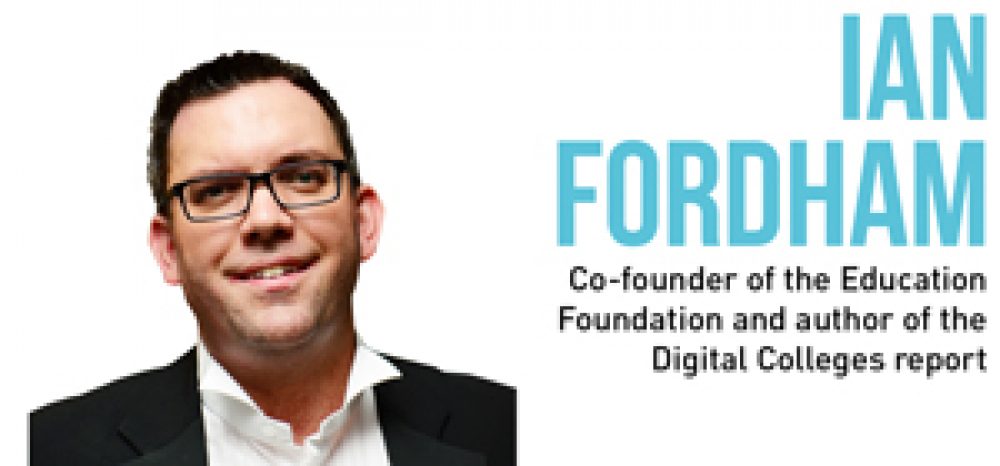The march towards a digital future is not in doubt, but how colleges stay on course is the cause of many a sleepless night for those in the FE sector, explains Ian Fordham.
There is a critical mass of factors coming together around the digital agenda in the UK that has the potential to disrupt and change the way the organisations operate and do business, as well as having far-reaching consequences for FE colleges and providers on the ground.
Numerous reports, including the Government Digital Strategy and Digital Inclusion plan, working groups and other forums have been set up to understand the implications of the digital world, culminating in the much-heralded Further Education Learning Technology Action Group (Feltag) report.
But despite the promise of that report, and the now aspirational 10 per cent online learning requirement, we are hearing from many principals and senior leaders that they are frustrated and struggling to get to grips with where to go next on tech and the digital agenda.
From our work on the Digital Colleges programme, set up by The Education Foundation and Penny Power, chair of Digital Business Britain, we have found that there is a growing distance between the ‘promise of digital’ and frankly too much tech evangelism, and the reality on the ground, in terms of implementation and sustainable change.
In addition, leaders are looking for a much clearer roadmap to become Digital Colleges, and a digitally driven sector, rather than being sent down “technology cul-de-sacs”.
There is a growing distance between the ‘promise of digital’ and frankly too much tech evangelism
In our report, (visit www.digitalcolleges.co.uk to download a copy of the Digital Colleges report) launched at the Association of Colleges conference, we showcase the digital journeys of FE leaders who are delivering high quality digital solutions across their institutions and sprinting past other sectors in terms of innovation and impact in their use of digital.
We also set out a framework for digital colleges that brings together all areas of provider practice and administration, from HR to finance to the engagement of small and medium-sized enterprises and the community to harnessing the potential of social media for the good of the whole of the organisation.
By starting with a much broader definition of digital, we argue there is a much better chance of the vibrant FE and skills sector achieving its ambitions.
And while the lights dim on Feltag and the new cross-Whitehall Education Technology Action Group reports its mostly school-related findings in January 2015, it is vital that the FE sector is on the front foot in the digital arena and there is a clear policy roadmap from government to ensure this transformation is not cut short.
Like many pragmatic colleges and leaders, we as an organisation are not dazzled by the bright lights of technology — but the digital economy is here to stay and growing at a frenetic pace.
The digital economy now accounts for almost 9 per cent of total GDP and between 2009 and 2012, 83,000 new technology and digital industry jobs were created, while the number of tech and digital companies has almost doubled from 50,000 to 88,000.
The FE and skills sector must harness its potential and be at the forefront of its development of this important sector, not technology for technology’s sake, but rather technology for all learners, staff and the wider community.
Now is the time for FE and policy leaders to move past the “bright lights of tech” and see the systemic change happening in this space.
It is vital that the leaders and ideas identified in our Digital Colleges report become the norm and not the exception.
As one FE principal said at the launch of our report, the Digital Colleges programme challenges the FE and skills sector to consider the digital agenda across the learner journey, across our businesses and between our stakeholders.
Its focus is not on a new paradigm or promise but on pragmatism, for far too long the digital box has been empty and the challenge for college leaders is to fill it with purpose.
We couldn’t agree more and welcome dialogue from the sector about how we can work together to achieve this vision.









I think to describe the FELTAG light as fading is a gross misrepresentation of the reality in the majority of FE providers!
The 35 FELTAG recommendations and the Govt response are predicated on pragmatism not evangelism.
The FELTAG momentum is increasing not fading!
Thanks Bob. As mentioned on social media, I applaud the FELTAG report, the work that’s gone into its implementation, and also whats being picked up in ETAG. My comment was about the rapid policy timescale and the urgency to get as many colleges and leaders on board and working towards whole college support for digital, and not just on learning technologies, as outlined in our report. Look forward to continuing the discussion – as always 🙂